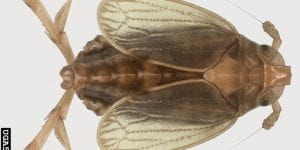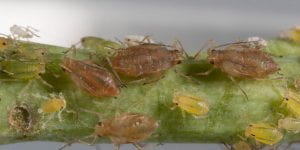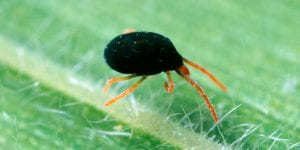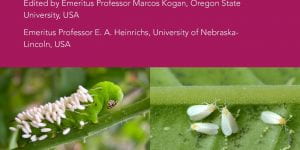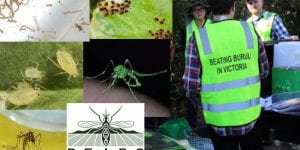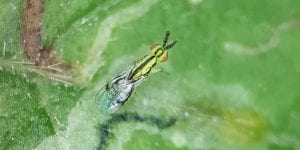Tag: Integrated Pest Management
-
A self-spreading bacterial infection in an agricultural pest that stops the pest from spreading plant viruses
Words: Ary Hoffmann Banner image: Natasha Wright, licensed under Creative Commons Attribution 3.0 License. In Asia, one of the most damaging pests of rise is the brown planthopper, Nilaparvata lugens. This pest damages plants directly but more importantly it acts as a vector for damaging plant viruses, including the “rice ragged stunt virus” (RRSV). This […] -
Uninvited guests in your groceries
Words, illustraions and photos: Marianne CoquilleauMarianne Coquilleau With spring coming our way, gardens come to life and with it their many inhabitants. It’s no surprise then to find small caterpillars, aphids and other insects while washing your vegetables and fruits, especially if you source your vegetables locally or pesticide-free sources. You might then also notice […]blogs.unimelb.edu.au/pearg/2020/09/17/uninvited-guests-in-your-groceries
-
Finished, but not yet free
Words by Samantha Ward & Marianne Coquilleau Illustrations by Marianne Coquilleau Photographs by Samantha Ward UPDATE – Samantha & Marianne have been interviewed on radio stations 2SER and The Pulse about their journey LINK 2SER || LINK The Pulse Concluding the postgraduate journey Covid-19 has shaken up the world as we know it. Everyone has […]blogs.unimelb.edu.au/pearg/2020/09/08/finished-but-not-yet-free
-
Targeting the bacteria inside insects for improved pest management
This article was first published on Pursuit. Read the original article Francesca Noakes and Professor Ary Hoffmann Any home gardener knows of the long-running battle against insect pests. The little critters that sneak into your garden beds and strip leaves are irritating among prized kale, but for farmers these tiny pests can have devastating economic […] -
New Pursuit article – Have resistance, will travel
This article was first published on Pursuit. Read the original article here. Authors: Dr Nancy Endersby-Harshman, Dr Qiong Yang, Dr Tom Schmidt and Professor Ary Hoffmann Around the world, pest insects – like mosquitoes – often become resistant to the insecticides meant to control them, causing problems for agriculture and public health. Resistance in multiple populations […]blogs.unimelb.edu.au/pearg/2020/05/28/new-pursuit-article-have-resistance-will-travel
-
Looking for a funded PhD or MPhil scholarship?
The Australian Grains Pest Innovation Program (AGPIP) is offering 4 fully funded scholarships at the University of Melbourne for potential PhD or MPhil students interested in cutting-edge science, environmental sustainability and agricultural innovation. AGPIP is a collaboration between the PEARG and cesar. The program is aimed at improving the sustainability of invertebrate pest management practices […]blogs.unimelb.edu.au/pearg/2020/04/06/looking-for-a-phd-or-mphil-scholarship
-
New publication: Ecological impacts of pesticides and their mitigation within IPM systems
Pest control is recognised as an important part of crop production. Against a background of increasing concern for chemical impacts on the environment, Integrated Pest Management programs have been developed where chemical application and natural enemy enhancement work together to maintain productivity with reduced environmental impact. Such programs require good science, general theory and strong […] -
With great power comes great responsibility…
Words: Samantha Ward Images: Words: Samantha Ward & Marianne Coquilleau Flying the flag for the PEARG lab! [Photo credit: Marianne Coquilleau] I am a scientist. A taxonomist, to be more specific. Taxonomy is the study of naming, defining, and categorising organisms. There’s a job for that?! Actually, we still have no idea how many species […]blogs.unimelb.edu.au/pearg/2019/12/19/with-great-power-comes-great-responsibility
-
MSc projects 2020 – Students wanted
We are seeking motivated MSc students to apply for several projects starting next year. Enquiries via pearg-queries@unimelb.edu.au Project 1/4: Exploring bacterial symbionts for agricultural pest control PEARG is researching ways to control important agricultural pests such as aphids and mites that cause millions of dollars in damage to crops each year in Australia. This project […]blogs.unimelb.edu.au/pearg/2019/06/14/msc-projects-2020-students-wanted
-
The economic benefit of biodiversity in agriculture
Words: Linda Thomson Image: Zagrammosoma latilineatum by Elia Pirtle Along with sustainability, biodiversity is a current catchword. Our work demonstrating the benefits of non crop vegetation on increasing biodiversity and especially “beneficials’ which contribute to pest control in crops. Enthusiasm for the project is shown by the excellent attendance at a recent workshop – report of […]blogs.unimelb.edu.au/pearg/2018/09/07/the-economic-benefit-of-biodiversity-in-agriculture
Number of posts found: 11
